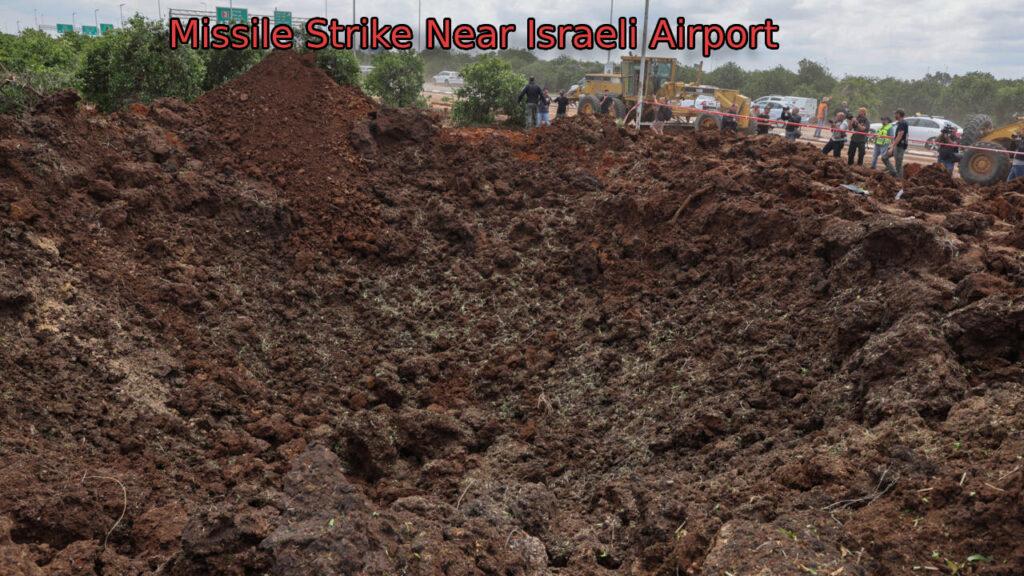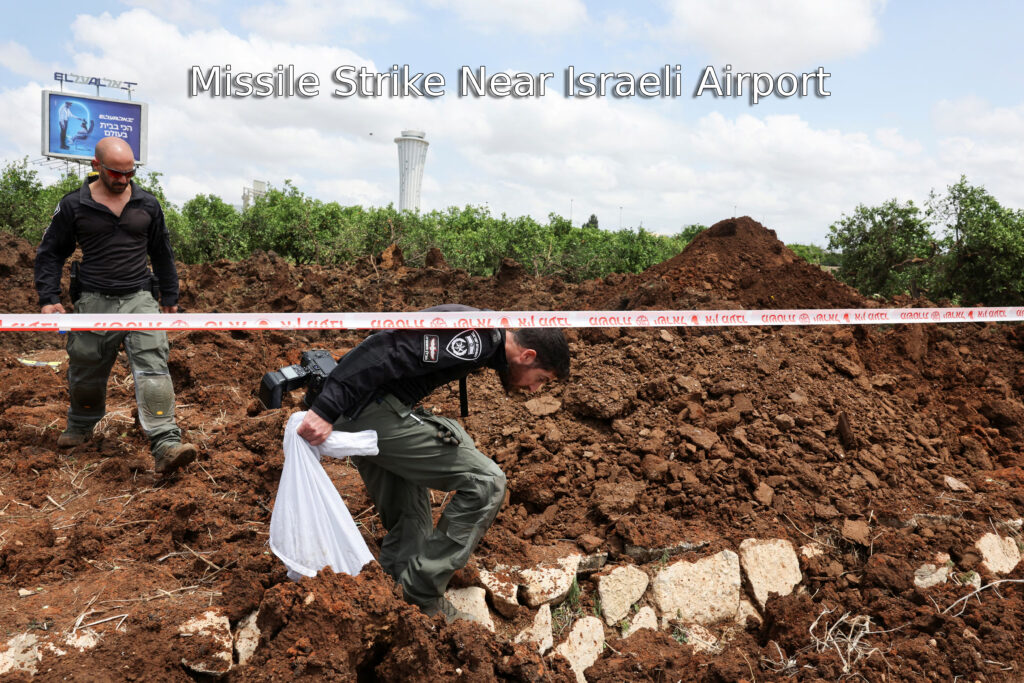In a significant escalation of regional conflict, a Missile Strike fired by Yemen’s Iran-backed Houthi rebels landed near Ben Gurion Airport, Israel’s main international gateway, on Sunday, May 4, 2025. While the Missile Strikecaused no casualties or serious structural damage, it did lead to temporary panic and a brief suspension of flight operations. The attack signals growing hostilities in the region and raises security concerns for both air travel and geopolitical stability.
This article examines the event, the motivations behind the Houthi strike, the immediate Israeli response, and the potential implications for regional and global security.
Table of Contents
Missile Strike Near Ben Gurion Airport
Early Sunday morning, air raid sirens echoed through the outskirts of Tel Aviv as a missile from Yemen flew toward Israeli airspace. Israeli defense systems were activated, but the missile managed to land in an open area not far from Ben Gurion International Airport, Israel’s busiest and most critical aviation hub.
According to Israeli police, no significant damage was caused by the missile, and there were no casualties. However, the explosion resulted in visible smoke plumes near the airport’s outer perimeter. Videos circulated online showed confused and frightened travelers being ushered away from terminal windows and security personnel moving swiftly to assess the threat.
Flight operations were halted for approximately one hour as a precaution, and incoming aircraft were redirected to alternate airports. Outgoing flights resumed shortly after security assessments confirmed that there was no immediate threat to the airport’s infrastructure or passengers.
Who Are the Houthis and Why Did They Attack?
The Houthi movement, also known as Ansar Allah, is a Yemeni rebel group that emerged from the Zaidi Shia Muslim minority in northern Yemen. Since 2015, the Houthis have been fighting a brutal civil war against the Saudi-backed Yemeni government. Over the years, they have increasingly positioned themselves as part of the Iran-led “Axis of Resistance”, which includes militant groups like Hezbollah and Hamas, all of whom are hostile to Israel and aligned with Iranian regional strategy.
The Houthis claimed full responsibility for the missile strike, describing it as part of their solidarity campaign with Palestinians in Gaza, particularly in the wake of intensified Israeli military operations there. This isn’t the first time the Houthis have launched missiles or drones toward Israel, but the targeting of Ben Gurion Airport represents a major escalation and a symbolic choice aimed at disrupting Israel’s sense of security and international connectivity.
In recent months, the Houthis have launched several long-range attacks, including drones and ballistic missiles, toward Israel and Saudi Arabia. These attacks are intended to pressure regional adversaries and assert the group’s relevance in the broader Arab-Israeli conflict.

Israel’s Response: “We Will Retaliate”
Israeli Prime Minister Benjamin Netanyahu responded swiftly with a warning. In a video released by his office, he said, “We attacked in the past, we will attack in the future.” The message was clear: Israel considers this missile strike a direct act of aggression and will respond militarily.
Israel has not yet disclosed specific details about its planned retaliation, but military analysts suggest that targeted airstrikes against Houthi missile infrastructure in Yemen’s northern provinces are likely. The Israeli Air Force has previously conducted long-range operations in foreign territories, and such a move would not be without precedent.
Netanyahu also held an emergency meeting with his security cabinet, coordinating with the Israel Defense Forces (IDF) and the Mossad to evaluate Yemen’s missile capabilities and to bolster defenses around critical infrastructure, including airports and energy facilities.
Flight Safety and Civilian Panic
The temporary grounding of flights at Ben Gurion Airport highlights the vulnerability of civilian aviation to geopolitical conflict. As Israel’s primary gateway to the world, the airport processes millions of passengers annually and is considered a vital national asset. Any attack on or near this facility poses severe economic, psychological, and diplomatic consequences.
Passengers at the terminal during the Missile Strike described scenes of confusion and fear. “There was a loud noise, and we saw smoke through the windows. Everyone ducked down,” said one American tourist. Airport security teams quickly moved to manage the situation, but the incident has sparked new discussions about aviation security in war-prone zones.
The International Civil Aviation Organization (ICAO) issued a statement urging regional actors to respect international air safety laws, warning that attacks near civilian airports could lead to catastrophic outcomes.
Regional and Global Reactions
The Houthi missile strike near Ben Gurion Airport has triggered widespread international concern. Here’s how major players have responded:
- United States: The White House condemned the attack and reaffirmed its “ironclad” support for Israel. U.S. officials have also offered assistance in bolstering Israeli missile defense systems, particularly in urban areas.
- Saudi Arabia: Although Riyadh has not officially normalized relations with Israel, the Saudi government also condemned the missile attack, calling it a “dangerous escalation” by the Houthis and a violation of regional stability.
- Iran: Tehran has not directly commented on the attack, but analysts believe Iran’s support for the Houthis is part of its broader proxy strategy aimed at challenging both Israeli and Western interests in the region.
- United Nations: The UN Secretary-General expressed “deep concern” and called for restraint on all sides. A special emergency session of the UN Security Council has been scheduled to discuss the recent escalation.

Broader Implications for Middle East Security
The missile landing near Ben Gurion Airport signifies a dangerous turn in Middle Eastern warfare. It suggests that even non-bordering actors like the Houthis can now project power across thousands of kilometers using Iran-supplied missile technology. The attack also raises questions about the effectiveness of Israel’s defense systems, particularly when facing long-range ballistic threats from unconventional sources.
Furthermore, this development could potentially reshape regional alliances. As tensions escalate, Israel might seek deeper security cooperation with Gulf States like Saudi Arabia and the UAE. In turn, Iran may increase support for proxy groups across the region, deepening divisions and raising the likelihood of further conflict.
Final Thoughts about Missile Strike
The Houthi Missile Strike near Israel’s Ben Gurion Airport has heightened tensions in an already volatile Middle East. While the immediate impact was limited to brief panic and flight delays, the symbolic nature of the attack—and its implications for regional security—cannot be ignored.
This incident Missile Strike serves as a wake-up call about the evolving nature of modern warfare, where non-state actors can target critical civilian infrastructure far beyond their borders. With Israel promising retaliation and the Houthis vowing continued attacks, the coming days may see further escalation unless urgent diplomatic efforts are made to de-escalate tensions.
As the situation unfolds, global attention will remain focused on how Israel, its allies, and regional rivals choose to respond to this growing threat.